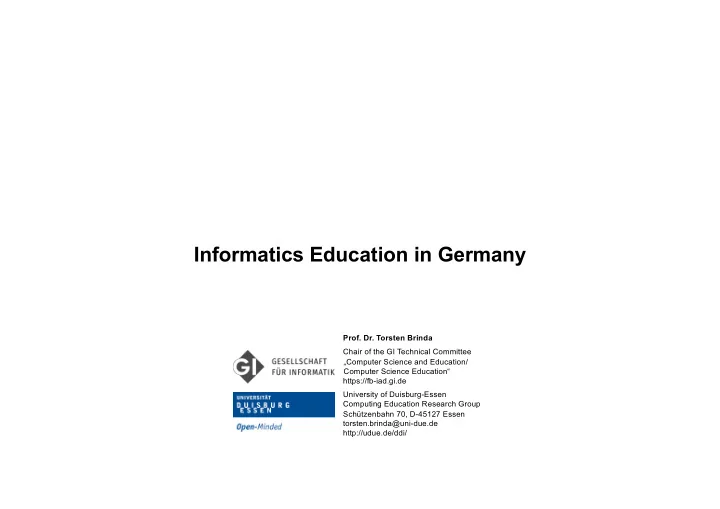

Informatics Education in Germany Prof. Dr. Torsten Brinda Chair of the GI Technical Committee „Computer Science and Education/ Computer Science Education“ https://fb-iad.gi.de University of Duisburg-Essen Computing Education Research Group Schützenbahn 70, D-45127 Essen torsten.brinda@uni-due.de http://udue.de/ddi/
2 ICILS 2013 results influenced political situation Frequency of computer usage by teachers in the classroom Frequency of computer usage by students in the classroom Intern. average Germany Every day Every day At least once a week, but every day At least once a week, but every day At least once a month, but not every week At least once a month, but not every week Less than once a month Less than once a month Never Never torsten.brinda@uni-due.de Bos et al. 2014 WiPSCE 2018, Potsdam, 05.10.2018
3 Strategy of the German Standing Conference of Ministers of Education and Cultural Affairs (KMK): Education in the digital world Recommendations for Informatics education of the German Informatics society (2008, 2016, 2019) Competence areas Content fields o r f M K K e h t o f s o n t i 2 ) d a 1 n 2 0 m e ( + m o l = o o c c h R e s i n n i o a t u c d e i a e d m “European Framework” Informatik Document was searched. K12CS No matches. torsten.brinda@uni-due.de http://bit.do/kmkstrat WiPSCE 2018, Potsdam, 05.10.2018
4 German situation Mecklenburg Western Pomerania Informatics as a Informatics as a mandatory mandatory optional or school subject optional school subject l a l 4 s c i t a m l l a r o 4 f t n o I N s c i t a m Saxony r o f n I In progress: integration of learning with and about digital media in all Bavaria subjects (KMK strategy), includes: Baden- Württemberg torsten.brinda@uni-due.de WiPSCE 2018, Potsdam, 05.10.2018
5 Do we need a separate mandatory subject in addition to the integration of learning with and about digital media in all subjects? Dealing with commonsense Rejection of Handling vs. Systematic conceptions Increasing the Societal content and concepts competency productivity needs goals Equal Job Autodidactics development potential opportunities qualification Co-create, CS = media argument Demand for Innovation of not just education Integration vs. professionals Rejection of new society Systematise consume subject compul. subjects Developmental- Non- technical Elect. subject dep. psychol. reasons Uncertainty: Term integrable Learning time on local contexts concepts terminology “Informatics“ content Unwanted Not enough Concepts for Competences binding of Unwanted Educational Established qualified teacher for the digital responsibilities continuation value subject teachers education world pro contra torsten.brinda@uni-due.de WiPSCE 2018, Potsdam, 05.10.2018
6 Do we need a separate mandatory subject in addition to the integration of learning with and about digital media Rejection of Handling vs. content and concepts in all subjects? goals Job Autodidactics qualification CS = Media argument Education Integration vs. Rejection of new compul. subjects subject Developmental- psychol. reasons Term Learning time „Informatics“ Unwanted Not enough binding of Unwanted qualified Dealing with responsibilities continuation teachers commonsense conceptions Increasing the Systematic Societal competency productivity needs contra Equal development potential opportunities Co-create, Demand for Innovation of not just professionals society Systematise consume Non- technical Elect. subject dep. Uncertainty: integrable concepts on local contexts terminology content Concepts for Competences Counter arguments Educational Established teacher for the digital value subject education world mostly refutable pro torsten.brinda@uni-due.de WiPSCE 2018, Potsdam, 05.10.2018
7 Further challenges • Teacher professional development (All teachers, CS teachers) • Media education representatives o are better networked with educational politics than representatives from the computer science education community o have key positions in the ministries of education and thereby presumably prevent the extension of computer science education at school • Educational politicians o Lack of understanding, what Informatics/CS o Tendency to avoid conflicts à competencies abstractly delegated into other subjects • Many stakeholders: other stuff is more important (reading, writing, maths, …) o CSE should only be part of vocational training o Students learn a lot about the use of computing systems during their spare time with peers – why therefore waste lessons in schools torsten.brinda@uni-due.de Webb et al. 2019 WiPSCE 2018, Potsdam, 05.10.2018
8 (Recommendations for) Actions • Make sure, Ministers are reached with recommendations • Provide some concrete recommendations, how to overcome the problem of limited resources concerning time etc. • Decide on a qualification framework for teachers, who teach computer science o Maybe also for those, who have to integrate CS aspects in the ordinary teaching of their subjects o Fundamental CS competences for teachers • Write a paper from the educational politicians’ perspective: what are the benefits for them, …, how to avoid conflict, … • Make recommendations available in different languages torsten.brinda@uni-due.de Webb et al. 2019 WiPSCE 2018, Potsdam, 05.10.2018
Thank you for your attention! Prof. Dr. Torsten Brinda Chair of the GI Technical Committee „Computer Science and Education/ Computer Science Education“ https://fb-iad.gi.de University of Duisburg-Essen Computing Education Research Group Schützenbahn 70, D-45127 Essen torsten.brinda@uni-due.de http://udue.de/ddi/
10 References • ACM, CODE, et al.: K–12 Computer Science Framework, URL: k12cs.org • Bos, W., Eickelmann, B., Gerick, J., Goldhammer, F., Schaumburg, H., Schwippert, K., Senkbeil, M., Schulz-Zander, R. & Wendt, H. (2014). ICILS 2013. Computer- und informationsbezogene Kompetenzen von Schülerinnen und Schülern in der 8. Jahrgangsstufe im internationalen Vergleich (in German). Münster: Waxmann. • Ferrari, A. (2013). DIGCOMP: A framework for developing and understanding digital competence in Europe, URL: https://ec.europa.eu/jrc/en/digcomp/digital-competence-framework • German Informatics Association (2008, 2016, 2019): Educational standards for informatics education (in German), URL: www.informatikstandards.de • Standing Conference of the Ministers of Education and Cultural Affairs (2012): Medienbildung in der Schule (in German), URL: http://bit.do/kmkmb • Standing Conference of the Ministers of Education and Cultural Affairs (2016): “Education in the Digital World” strategy Summary, URL: http://bit.do/kmkstrat • Webb, M., et al. (2019): Coding, Programming and the Changing Curriculum for Computing in Schools Report of UNESCO/IFIP TC3 Meeting at OCCE – Wednesday 27th of June 2018, Linz, Austria, URL: http://bit.do/ifipunesco torsten.brinda@uni-due.de WiPSCE 2018, Potsdam, 05.10.2018
Recommend
More recommend